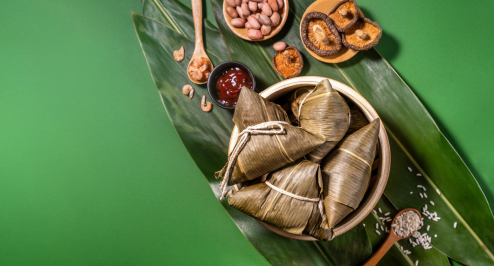
Duanwu Festival, or Dragon Boat Festival, falls on the fifth day of the fifth month on the lunar calendar every year. It is a 2,000-year-old tradition celebrated nationwide in various forms to honor the ancient poet Qu Yuan, who drowned himself in despair over his country’s fate. How do people usually celebrate it?
Hold dragon boat races. Dragon boats are named for their shape, which resembles a traditional Chinese dragon. They have been held for centuries. The races were inspired by villagers’ brave attempts to save Qu Yuan from the Miluo River.
Eat zongzi. Zongzi is a pyramid-shaped sticky rice dumpling wrapped in leaves. In north China, people favor sweet zongzi, while in the south salty ones filled with fresh meat or egg yolk are more popular. Nowadays, zongzi has already become a common food, which can be easily found in supermarkets and food stores. However, some families still maintain the tradition of making zongzi on the festive day.
Hang wormwood and calamus (菖蒲). It is said that hanging wormwood and calamus leaves on doors or windows can protect people from evil spirits. From a scientific point of view, Dragon Boat Festival falls in hot summer, when pests and other poisonous animals are active; both the leaves give off a special smell, which can clean the air and drive out pests, thus helping people stay away from diseases.
Wear scented sachets (香包). It has the same purpose as hanging calamus and wormwood, as the sachets are always filled with Chinese herbs which can drive away poisonous animals and evil things. Nowadays, it is more popular among children and they are usually made into various shapes, including the traditional zongzi pattern, various animals, pumpkins and flowers.
Put a picture of Zhong Kui on doors or windows. Zhong Kui is a famous exorcist (驱魔人) in Chinese folk stories. His picture, a fierce-looking male brandishing (挥舞) a magic sword, is hung up in Chinese houses to scare away evil spirits and demons, especially during Dragon Boat Festival.
Besides, there are some customs popular in certain areas, including egg balancing competitions, wearing five-color silk thread, drinking xionghuangjiu, eating eggs boiled with tea, etc.
1.1. Why did people first hold dragon boat races according to the text?
A To honor Qu Yuan’s poetry.
B To try to rescue Qu Yuan from the river.
C To copy the dragon’s shape.
D To show national pride.
解析:选B。推理判断题。根据第二段最后一句“The races were inspired by villager’s brave attempts to save Qu Yuan from the Miluo River.”可知,赛龙舟源于“村民勇敢拯救屈原”。故选B。
2.2. What traditional zongzi custom is still kept by some families today?
A Buying them from stores.
B Using meat fillings in the north.
C Making homemade zongzi at home.
D Adding sweet beans in the south.
解析:选C。C细节理解题。根据第三段最后一句“However, some families still maintain the tradition of making zongzi on the festive day.”可知,在过端午节期间,一些家庭仍然保留着自己在家里包粽子的传统。故选C。
3.3. What is the scientific purpose of hanging calamus leaves?
A To attract children’s interest.
B To frighten evil spirits.
C To treat illnesses.
D To keep pests away.
解析:选D。D细节理解题。根据第四段中的“From a scientific point of view...both the leaves give off a special smell, which can clean the air and drive out pests”可知,从科学的角度来看,挂艾草和菖蒲是因为它们会散发出特殊的气味,这些气味可以驱赶害虫,从而帮助人们远离疾病。故选D。
4.4. Which item is NOT used for driving away evil spirits?
A Calamus leaves.
B Scented sachets.
C Zhong Kui’s picture.
D Tea-boiled eggs.
解析:选D。细节理解题。根据最后四段可知,挂艾草和菖蒲、佩戴香包、贴钟馗像都是可以辟邪的,并不包含茶叶蛋。故选D。